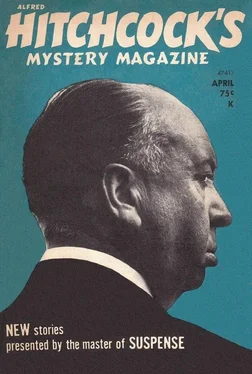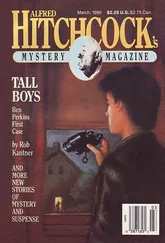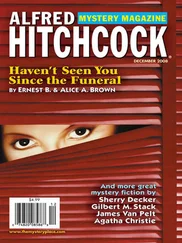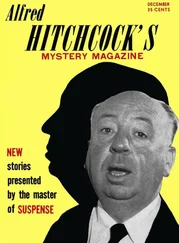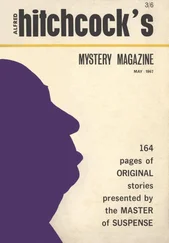Роберт Колби - Alfred Hitchcock’s Mystery Magazine. Vol. 17, No. 4, April 1972
Здесь есть возможность читать онлайн «Роберт Колби - Alfred Hitchcock’s Mystery Magazine. Vol. 17, No. 4, April 1972» весь текст электронной книги совершенно бесплатно (целиком полную версию без сокращений). В некоторых случаях можно слушать аудио, скачать через торрент в формате fb2 и присутствует краткое содержание. Город: Riviera Beach, FL, Год выпуска: 1972, Издательство: H.S.D. Publications, Жанр: Детектив, на английском языке. Описание произведения, (предисловие) а так же отзывы посетителей доступны на портале библиотеки ЛибКат.
- Название:Alfred Hitchcock’s Mystery Magazine. Vol. 17, No. 4, April 1972
- Автор:
- Издательство:H.S.D. Publications
- Жанр:
- Год:1972
- Город:Riviera Beach, FL
- ISBN:нет данных
- Рейтинг книги:5 / 5. Голосов: 1
-
Избранное:Добавить в избранное
- Отзывы:
-
Ваша оценка:
- 100
- 1
- 2
- 3
- 4
- 5
Alfred Hitchcock’s Mystery Magazine. Vol. 17, No. 4, April 1972: краткое содержание, описание и аннотация
Предлагаем к чтению аннотацию, описание, краткое содержание или предисловие (зависит от того, что написал сам автор книги «Alfred Hitchcock’s Mystery Magazine. Vol. 17, No. 4, April 1972»). Если вы не нашли необходимую информацию о книге — напишите в комментариях, мы постараемся отыскать её.
Alfred Hitchcock’s Mystery Magazine. Vol. 17, No. 4, April 1972 — читать онлайн бесплатно полную книгу (весь текст) целиком
Ниже представлен текст книги, разбитый по страницам. Система сохранения места последней прочитанной страницы, позволяет с удобством читать онлайн бесплатно книгу «Alfred Hitchcock’s Mystery Magazine. Vol. 17, No. 4, April 1972», без необходимости каждый раз заново искать на чём Вы остановились. Поставьте закладку, и сможете в любой момент перейти на страницу, на которой закончили чтение.
Интервал:
Закладка:
“Albert is a purist,” Mrs. Simpson said. “He doesn’t use sights on his bow, and he’s strictly a targetshooter. He doesn’t go hunting and he won’t even shoot at targets that are silhouettes of real animals.”
Albert nodded. “I don’t particularly approve of flight shooting either. Just a question of strength of back and bow. It just isn’t archery.”
I nodded sympathetically. “Personally I’ve always detested clout shooting. It doesn’t belong on the same field with the true bow and the stout shaft.”
We blended as Little John and Robin Hood. “Myra,” he said, “get the apricot brandy.”
Her eyes clouded. “I don’t remember exactly where I...”
They excused themselves and left together to find the brandy.
While they were gone, I went over the names of the regional winners in the Open and Senior divisions for the last three years. I made a list of all the names which appeared more than once. It seemed to me that if Uncle Charles was as good a bowman as his collection of trophies indicated, his present name was bound to be repeated. I copied six names that filled that condition.
It was also obvious that Uncle Charles couldn’t have won any tournaments going back more than three years, since he wasn’t here. I was able to cross four of the names off my list by going back six years and finding them repeated.
That left me with just two names of repeat winners in the last three years only: Hiram Brackish and plain old Thomas G. Carson.
Ordinarily I could not conceive of anyone changing his name to Hiram Brackish; however, we live in the world of Engelbert Humperdinck and one can no longer be positive of anything.
Simpson and his wife returned with the apricot brandy.
“It was on the top shelf of the kitchen cabinet,” Simpson said. “I remember that I wanted to keep it out of the reach of innocent children.”
Mrs. Simpson carried an egg cup which she used to measure brandy into our punch glasses.
I glanced at the sheets I held. “Hiram Brackish seems to be quite a winner.”
Simpson agreed. “Young fellow of about twenty-five. Just graduated from law school.”
That eliminated Hiram.
I sipped my brandy. “The name Thomas G. Carson seems to ring a bell. In his early fifties, isn’t he? Slightly graying?”
“About fifty and graying,” Simpson agreed. “Has a beard. Moved here some three years ago. Don’t know exactly from where.”
“He’s a salesman, isn’t he?”
“No,” Simpson said. “A veterinarian.”
Mrs. Simpson stepped in. “Not actually a veterinarian. He just works for one. The Danvers Cat and Dog Hospital, I believe.”
“Does he come to your meetings?”
“Never misses a one,” Simpson said. “Very personable and a real archery buff. There’s even talk about running him for vice-president next year.”
Simpson went back to the filing cabinet and removed another folder. He leafed through what appeared to be a collection of newspaper clippings. “Here’s a photo of Brackish when he won the Spring Event in the instinctive open.” He frowned. “Doesn’t seem to be any picture of Carson, though. Rather a shame. He’s really the outstanding bowman in the club. I’ve been trying to get him to enter tournaments at the state level, but he always has some excuse.”
“Albert had his picture in the paper five years ago,” Mrs. Simpson said proudly.
Simpson cleared his throat. “Didn’t have anything to do with archery, though.”
“It was at the ground-breaking ceremonies for the new Whittenberger Supermarket,” Mrs. Simpson said. “Albert’s firm was doing the constructing.”
Albert happened to have the clipping handy. It showed three men, one of them applying a foot to the shoulder of a spade. None of them was Albert.
“He’s in the background,” Mrs. Simpson said. “Just behind the ropes. Smiling.”
“You take a good picture,” I said.
Albert blushed and reached for the apricot brandy bottle. “Let’s have another.”
We spent the evening talking about archery. At nine I glanced at my watch. “I didn’t realize it’s this late. I’ve really got to go.”
Mrs. Simpson smiled tentatively. “Aren’t you going to take any pictures?”
I smiled apologetically. “I just write the stories. If things work out, I’ll send a photographer over later. You understand, of course, that just because I write the story, there is no guarantee that it will be published?”
I left, feeling guilty somehow.
I drove on to the Harbor Motel and parked. At precisely nine-thirty, Mrs. Finley appeared in her car with Eldon Tupper. They went to the motel office, as instructed, and registered as man and wife. I watched them walk to one of the units, Eldon carrying an armload of books and papers and Mrs. Finley nervously eyeing the parked cars. They disappeared into unit No. 11.
I duly made a note of the time and place and then drove to the nearest drugstore. I consulted the phone book there for the listing of Thomas G. Carson.
I drove to his address. It proved to be a new four-story apartment building. In the vestibule I checked the names on the mailboxes and found Mr. & Mrs. Thomas G. Carson.
Mrs. Carson?
I went up the stairs to the second floor and knocked on door number 203. After a few moments, a man with a neatly-trimmed beard opened the door.
Yes, this was Uncle Charles. He had grown the beard, of course, but there was no mistaking him: the careful humor behind the eyes, the impression of competence.
“Yes?” he asked.
But now that I had found Uncle Charles, I wasn’t supposed to talk to him. I was to tell Ariana where she could find him, and that was all.
I dragged up the memory of one of the other names on the mailboxes downstairs. “Mr. Yancey?”
Uncle Charles shook his head. “I’m afraid you have the wrong apartment.”
Behind him I heard a television set being turned down and then a woman’s voice. “Who is it, Tom?”
“Someone looking for a man named Yancey.”
The woman appeared. She was perhaps forty, but slim, and with her, too, one felt an aura of competent intelligence.
She came forward. “Yancey? Isn’t there a Yancey down at the end of the corridor?”
Uncle Charles shrugged. “I don’t know our neighbors that well, Marie.”
I smiled. “I’d better go downstairs and check the mailbox numbers again.”
Outside the building, I got into my car and began driving home.
Well, that was that. All I had to do now was phone Ariana and tell her where she could find her Uncle Charles. But I thought that could wait a while. There were still a few things bothering me and I wanted to take care of them in the morning.
At my apartment, I set the alarm for seven-thirty and then went to bed.
In the morning after breakfast, I drove back to the Harbor Motel and parked. Eleven minutes later, at precisely eight-thirty, Mrs. Finley and Eldon Tupper opened the door of unit No. 11 and exited. She waved to me as they drove away.
Back in town, I found a client waiting in my outer office. He had bushy red hair, a full mustache, and he blinked fairly often.
I smiled. “I’ll be with you in five minutes. I have a little errand to do down the hall.”
I went on to Morris Willman’s office and found him drinking coffee. “Morris,” I said, “I want you to find out who and what Uncle Charles really is or was.”
“Any helpful suggestions about how I accomplish this feat?”
“Phone the main library and get the Reference Room. Ask somebody there to get a copy of Who’s Who in America and look up Hector Collier.”
“Why Hector Collier?”
“Because quite often a man’s biography will mention the maiden name of the woman he married. I imagine his wife insists upon it — and in this case, the maiden name would be Uncle Charles’ last name. Right?”
Читать дальшеИнтервал:
Закладка:
Похожие книги на «Alfred Hitchcock’s Mystery Magazine. Vol. 17, No. 4, April 1972»
Представляем Вашему вниманию похожие книги на «Alfred Hitchcock’s Mystery Magazine. Vol. 17, No. 4, April 1972» списком для выбора. Мы отобрали схожую по названию и смыслу литературу в надежде предоставить читателям больше вариантов отыскать новые, интересные, ещё непрочитанные произведения.
Обсуждение, отзывы о книге «Alfred Hitchcock’s Mystery Magazine. Vol. 17, No. 4, April 1972» и просто собственные мнения читателей. Оставьте ваши комментарии, напишите, что Вы думаете о произведении, его смысле или главных героях. Укажите что конкретно понравилось, а что нет, и почему Вы так считаете.
